What is a Growth Marketing Manager? (And Why You Need One)

You know you're in for a good time when you search for a professional role and see a bunch of blog posts with titles like "What is a growth marketing manager and what does it mean?" and "Why your team needs a growth manager." Any time you have to convince people that the position is real is a fun one.
In this case, though, the role of a growth manager is quite fundamental and quite important. It's one of those "new" positions that's more of a combination and rebrand of old roles and positions under a new heading to make it more attractive and relevant to the modern world.
So, what is it, why do you need one, and how can you hire one?
What is a Growth Marketing Manager?
Let's start with a definition from elsewhere. Specifically, in this case, from MarketerHire:
"Imagine you had a marketer on your team who could look at every element of your strategy — from media buying to creative execution — and implement quick, data-driven tweaks, like reducing ad frequency and increasing creative variation, to win you new customers and maintain those you already have."
Sounds reasonable, right? A manager who looks at data reports and top-level strategies implements them all up and down the funnel to improve growth, boost growth rates, increase the customer lifecycle and improve retention, save money, and more.
Many people distinguish "marketing" and "growth marketing." They say that marketing is all about the top of the funnel. Marketers focus on brand awareness and customer acquisition, but as soon as the customer is in your ecosystem, they stop and hand them over to your sales and retention teams. Meanwhile, a growth marketer looks at the whole funnel from awareness to the retention and strives to optimize the entire thing.
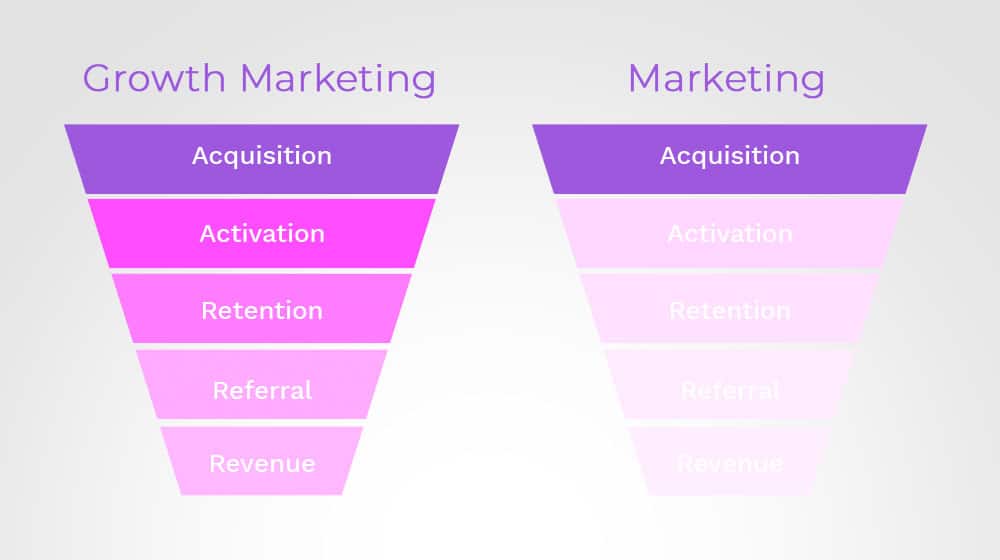
I think that's what a marketing manager should be doing anyway, and any marketer who isn't looking at the big picture is doing you a disservice. But, hey, I'm just a little guy in the world of marketing, and companies larger than mine are making this distinction.
Does that make me a growth marketing manager? Maybe!
Growth marketers are also known by names like Growth Hacker, Performance Marketer, and Digital Marketing Manager. See what I mean? It's one part combination of several roles into one expert and rebranding what a marketing team should have been doing all along. Startups are especially creative at using these rebranded job descriptions.
However, it can be a way to differentiate between two groups of people; those keeping up with the industry and those behind. If they call themselves a growth hacker, they probably at least have some idea of what they're doing. If they disavow growth hacking as a fad, well, maybe they aren't up to speed with the way modern marketing works.

Of course, all of these different terms have slightly different connotations and duties.
- Performance Marketers usually focus on paid channels and SEM, not organic channels like email marketing, SEO, and content marketing. They'll make use of landing pages, new acquisition channels, compare those marketing channels, and focus on the best growth opportunities.
- Marketing Managers, in general, tend to be holistically focused but might not pay as much attention to data as they do the constraints of budget and their gut instincts.
- Demand Generation Managers usually focus on the top of the marketing funnel to generate demand, as you had probably guessed. Their KPIs might be focused on organic visitors, click throughs, minizing user churn, and new user acquisition.
Growth Marketing Managers, meanwhile, encompass a little bit of everything. They use data and metrics to run marketing campaigns and experiments with small budgets and A/B testing, find optimal paths forward, and push the company budget in that direction.
Why Does Your Business Need a Growth Marketer?
Have I convinced you that your business needs a growth marketer? No? Let's look deeper, then.
Growth marketers are top-level employees, and they can be considered a member of the executive team, sometimes comparable to C-levels, sometimes just below them. They're responsible for high-level strategic vision, long-term planning, and the short-term actions used to implement those long-term strategies.
Small businesses often operate month to month and sometimes even week to week. Their budgets are tight; they don't have the time or energy to devote to marketing, experimentation, or metric monitoring. They might not have room in their roster to hire someone to do it, even though it would be a smart move.
Thus, they end up struggling, flailing wildly through Facebook ads and across trending social media. They might use out-of-date techniques they read about or half-remembered from past reading. They often look like trend-chasers. Rather than pushing forward, they struggle to keep up.
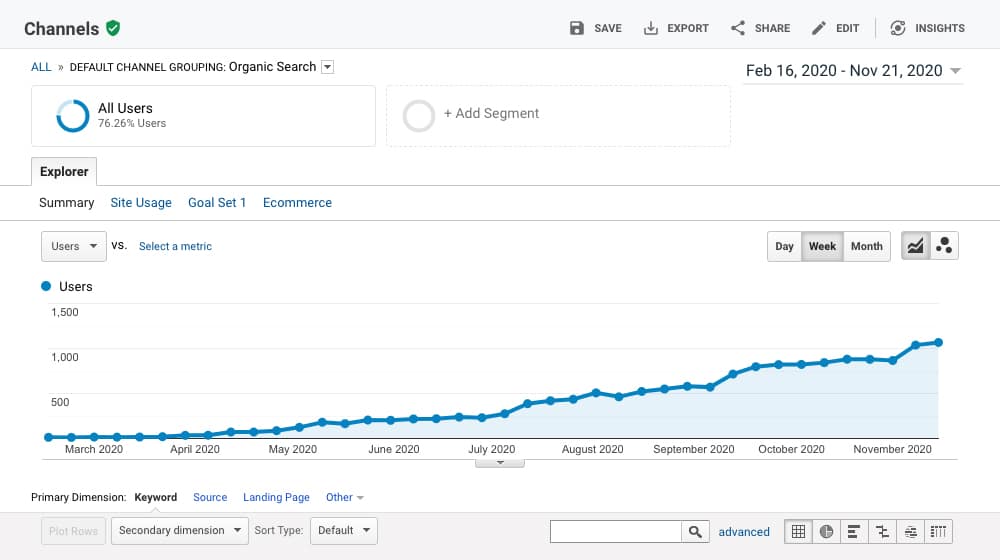
Meanwhile, a company that has the foresight to hire a growth marketing manager, by whatever name you want to call them, is a company that can develop longevity. They can identify what strategies have worked in the past and what is and isn't working now. They can figure out exactly where to invest your budget, no matter how shoestring it is, and turn that budget into more and more money. In short, they grow the company.
What Does a Growth Manager Do, Though?
Okay, but really, it's all fine and dandy to talk about growth in broad terms, but what does a growth marketing team do from day-to-day? When you talk about an executive guiding strategy, the first thought that comes to mind is a guy in a suit, in an office, thinking Deep, Important Thoughts, and issuing directives. That's pretty far from the truth.
You can break down the initiatives of a growth manager into a few categories.
1. Goal Setting
The first role of a growth manager is to take a look at the company's current state and set goals. The goals should be SMART: that is, Specific, Measurable, Attainable, Relevant, and Time-Based. In other words, the goals should be accurate, specific goals, not something nebulous like "bring in more profits." They should define metrics to monitor to measure whether or not you're reaching them, and they should have a deadline by which they should attain them if all goes well.
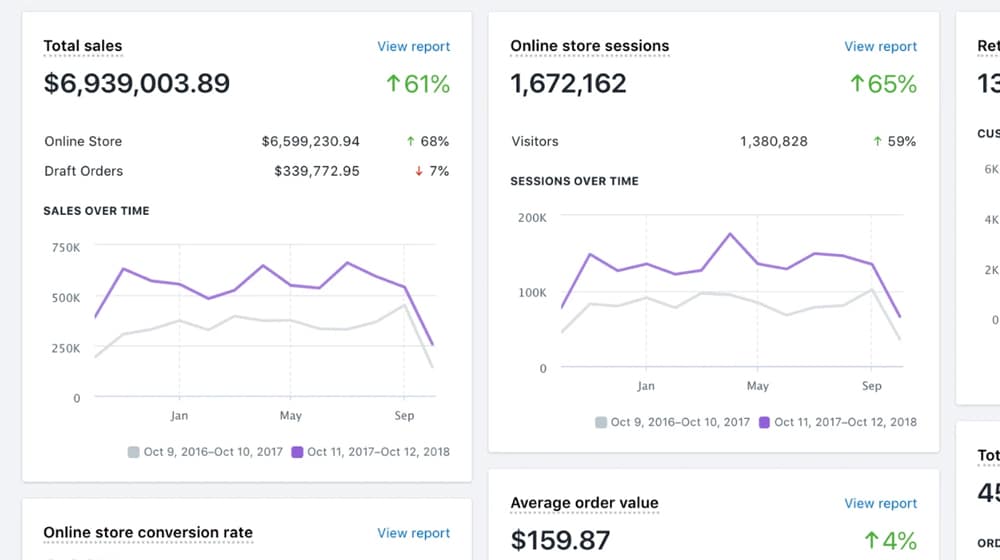
A growth manager should be experienced in business management to know what kind of goals and timeframes are reasonable. Different companies can have wildly different plans, and knowing when one is applicable is a tangible skill that needs to be developed.
2. Metric Monitoring
Part of setting SMART goals is knowing what metrics need to be monitored to track progress. Costs, costs per click, profits per conversion, average cart value, conversion rates; there are dozens of metrics you can scan to keep track of your business. Knowing which to watch, how to set up that monitoring, and the pitfalls of specific metrics are tricky and can take a lot of knowledge and deep thinking that a casual marketer might not understand.
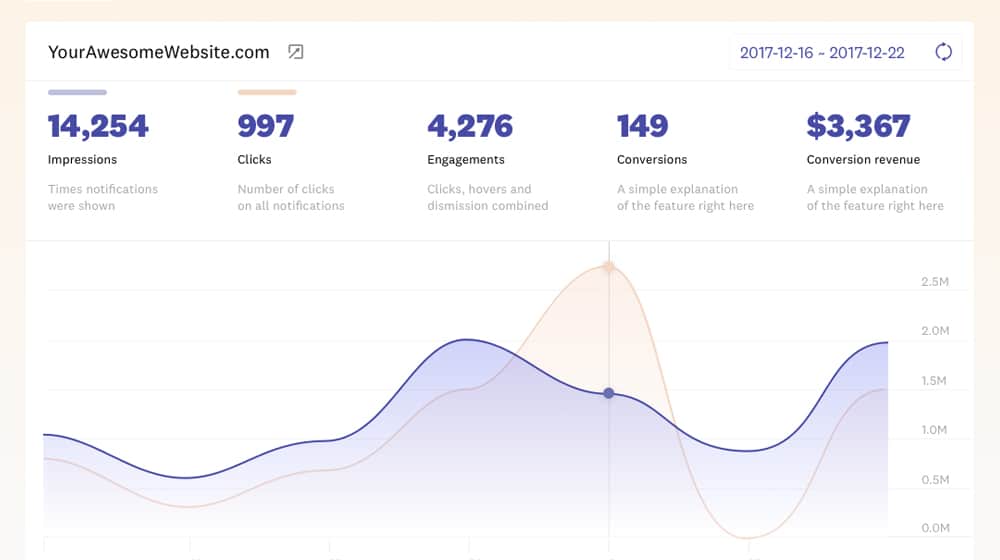
One of my favorite examples is the number of conversions versus the average value. Which of these two is better:
- 50 conversions
- 10 conversions
On the face of it, you would say 50, right? And, if all you monitor is conversion numbers, that's all you'll know. But what happens if you add average conversion value to the mix?
- 50 conversions at $5 per conversion
- 10 conversions at $50 per conversion
In this scenario, more conversions aren't better; you might have 50 conversions, but you're only making a total of $250. The manager who only gets 10 conversions is still walking away with $500, double the performance.
Of course, there's a lot more to it than even this simple scenario. You have to think about new versus repeat customers, average lifetime value, subscriptions versus single purchases, customer loyalty, even non-monetary conversions like email subscriptions and user experience. It can very quickly become a web of interconnected metrics, which can be challenging to sift through to find nuggets of wisdom, which is, after all, why you want to hire a specific growth manager to do the work.
3. Experimentation
Growth managers don't just sit back and watch metrics, and they figure out how to use that data to optimize marketing efforts. They take its marketing investment – content marketing, digital marketing, PPC, email, affiliates and referrals, social media – and experiment with them.
Does an investment in Facebook ads work for your company? Should you use Instagram ads instead? Would investing more in your blog have a better long-term effect? Can you get a boost if you set up some influencer marketing?

These are questions you don't know the answer to without trying and measuring the results. So, what a growth manager does is set up those experiments with small, limited budgets. When the results come in, they decide which investments are worth increasing and which investments aren't pulling their weight.
4. Adjustment
Adjustment is part of the daily task list of a growth manager, and some people have even compared it to day trading. Sure, you can throw money in an index fund and be assured of its growth, but a talented day trader making small decisions every day can out-perform the index fund. Of course, plenty of day traders can't beat the market, so it's maybe not the best analogy, but it works for now.
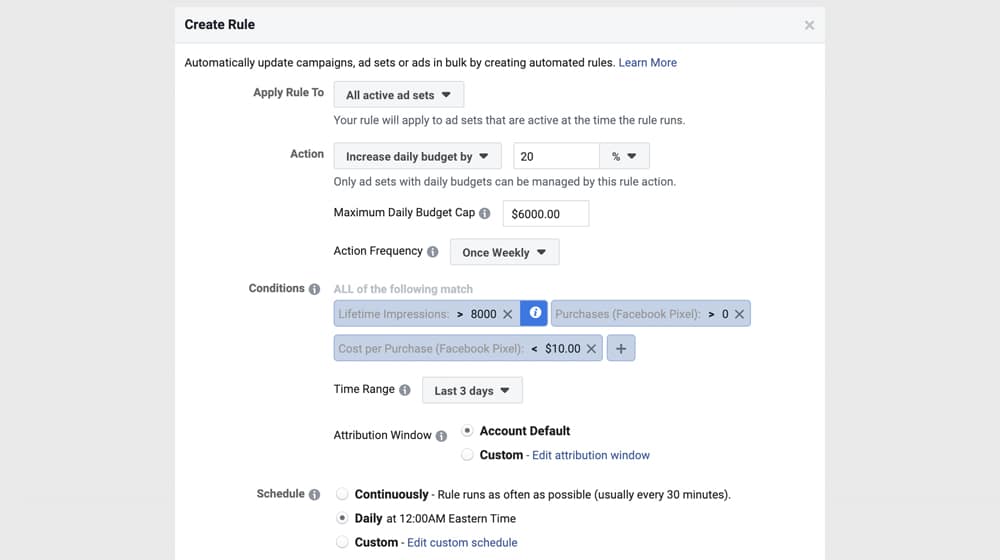
The key is to monitor things in a context that matters. Making choices to shuffle money around day to day can be effective, but it might be missing the forest for the trees. On the other hand, not making incremental changes every day could be leaving money on the table. The trick is finding a growth marketer that knows the difference.
5. Learning and Optimization
One of the keys to an effective growth marketing manager is learning. These individuals are talented and have a long-term vision, but they also need to stay educated and on top of their game. They need to keep learning modern techniques, strategies, and challenges that can crop up.
For example, a few years ago, Facebook was the place to be, and the only way you ever got visibility on the site was with clickbait. These days, clickbait is far less effective, and Facebook is arguably dying; thousands of businesses don't even use the platform anymore because younger generations aren't on it and older generations aren't buying.

Knowing, learning, changing, and growing is all part of the life cycle of a growth marketer.
Why Is It so Hard to Hire and Keep a Growth Manager?
Growth marketing managers are in high demand right now, and it's a challenging role to keep. There are pressures on both sides.
If you hire a growth marketing manager and they underperform, fail to grow your business, or even hurt your business, then you dump them and hire someone else. They've been unable to perform, and they aren't necessarily bad marketers, but they're a poor match for your business, so you need someone else.

On the other hand, if you hire one and they do very well, chances are they'll be adding that success to their resume. Talent scouts and large organizations are constantly scouting candidates on LinkedIn, and there's a possibility that they will poach them within a year or two. Growth managers have a high turnover rate because the bad ones get fired, and the good ones get poached.
Your business could use a growth marketing manager, but it can be tricky to find one willing to work with you and stick with you while having the skills and knowledge to help you succeed. It would help if you were aggressive with picking a good manager and even more aggressive with keeping the good ones around.
What Are You Waiting For?
So, what are you waiting for? Your business isn't going to grow itself. It's essential to find the right people to give you the strategy and setup necessary to succeed. These talented individuals will likely pay for themselves and then some.
At the very least, a growth marketing manager can come in, set up the monitoring and reporting necessary to grow, and teach you how to get the ball rolling. It's well worth the time to invest in one of these individuals, and keeping them around is a bonus.










November 26, 2021
I'd love to hire a growth manager, but I just don't know how to qualify them. Do you have a set of questions to ask them? Thanks
November 26, 2021
Hey Carolyn,
Thanks for your comment!
I wrote a guide on questions to ask a content marketer in an interview that may be helpful to you:
https://www.contentpowered.com/blog/questions-content-marketer-interview/
Content marketing is the screwdriver in a every growth manager's toolbox, so these would be good questions to start with 🙂
December 09, 2021
Nice read. I haven't considered investing in a growth marketing manager but your post might have convinced me. I'll bring it up with my team and see if they agree. Thanks, James.
December 09, 2021
Thanks Claire!
Please keep us in mind if you need external help. I'd love to have a chat with you about it, just drop me a line 🙂
December 30, 2021
This is very helpful. We're planning to hire one next year. I also saw your other post on interview questions to ask a content marketer and it seems very useful, too! Thanks a lot!
December 31, 2021
Hey Dan, glad you liked both of these posts! Good luck on hiring a marketer for your team!